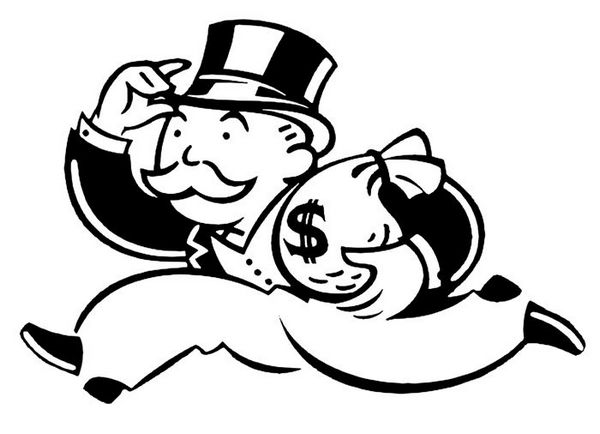Opinion: The Trouble with Monopolies

Most of the students reading this are too young to remember the 2008 Great Recession, but they’ve certainly felt its effects. Essentially, when real estate supply exceeded demand in 2007, the housing bubble burst. This normally would be a surmountable event, but it was made a hundredfold worse by deregulation of the big banks’ monopolies.
In 1999, the Clinton administration eliminated the Depression-era Glass-Steagall Act, which regulated investment banking, specifically high-risk stock trading. Once this check was gone, “the Big Four” banks of JPMorgan Chase, Bank of America, Citigroup, and Wells Fargo essentially were enabled to create monopolies, by accruing vast sums of capital, buying out competitors, and continuing their careless trading habits. Along with a few other banks, these “Big Four” became known as “too big to fail”, a phrase meaning that they had reached the size where, if they collapsed, the government would have to bail them out, to prevent an economic cataclysm.
Which is exactly what happened in 2008. When all those high-risk stocks collapsed due to that one housing bubble issue, the banks lost incredible amounts of money. If they were smaller businesses, the banks would declare bankruptcy, give their customers their money back, and quietly fade from the pecuniary scene. However, due to the innumerable masses of American citizens, myriad industries, and various local businesses depending on the Big Four, to lose them would be to plunge headfirst into depression as we’ve never seen before. So the Treasury had no choice but to give free money to those banks, just because they weren’t responsible with it before. This was money that could have been injected into much more useful areas, like the housing crisis.
After Obama took office, his administration approved the 2010 Dodd-Frank act, which was similar to Glass-Steagall but extremely toned down following heavy lobbying by those very bastions of corporate greed. The fact remains to today that those banks still exist, are about the same size, and are still considered “too big to fail” (though there have been some helpful regulations).
This historical problem with big businesses is not limited to the financial sector. Once these corporations control so much, they can take what they want from the little guy and have no consequences to pay, as the aforementioned example has iterated.
In pharmaceuticals, companies like Johnson & Johnson, Pfizer, and a few more hold the power to change the prices. Indeed, the pharmaceutical company Mylan recently changed the price of a two-pack of EpiPens from $100 to $600 over a period of seven years. This is blatant exploitation of a medical instrument certain groups of people need, and will pay any price to get. Other such travesties are plethoric.
In airlines, four big companies also run the scene: American, Delta, Southwest, and United control 86% of the air travel over the United States. They too manipulate ticket prices to maximize gain and minimize outrage, and treat us not like humans but like numbers (as proven by recent notorious incidents). They do this because they can, because there is nobody stopping them, and because they want to make more money.
You may think that fancy Silicon Valley corporations are liberal, and therefore not prone to exploiting humans through monopolizing. That is incorrect; Alphabet (the parent company of Google) controls 85% of Internet advertising, Facebook commands the attention of 2 billion users worldwide, and Amazon is the world’s largest online retailer, a rank it gained after eliminating hundreds of bookstores across the nation. All these corporations routinely subject us to their privacy invasions, bloated prices, and manipulation.
Since they can do what they want, these monopolies use an economic policy known as “extracting the rent”- a metaphor following the example of a single landlord owning all the apartments in a city. He can charge what he wishes, and people have no choice but to pay. The same is true for these corporations.
So why do we take all this lying down? The American populace just doesn’t understand how badly it’s being scammed, and governments won’t tighten their regulations because these businesses have the resources to influence politicians’ decisions. Probably nothing will change, but leftist senators Elizabeth Warren and Bernie Sanders have been pushing to break up the big businesses and reinstate Glass-Steagall. If that ever works out, and competitive markets resurface again, perhaps we can once again be charged fair prices by the business we chose to serve us.

